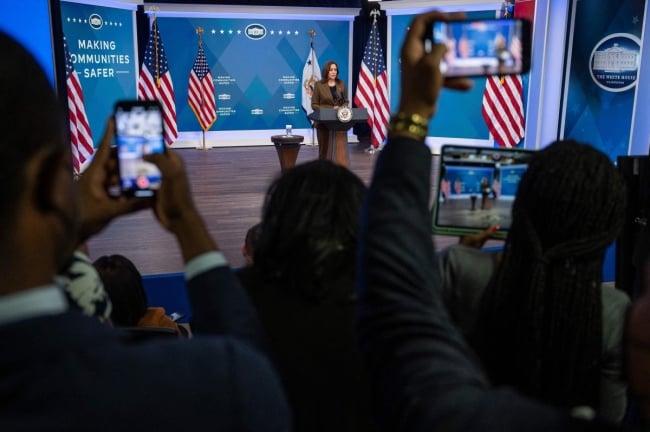You have /5 articles left.
Sign up for a free account or log in.

Vice President Kamala Harris announces that HBCUs affected by bomb threats are eligible for grants through the U.S. Department of Education.
Jim Watson/AFP/Getty Images
Some leaders of historically Black colleges and universities say they’re frustrated by a lack of communication and insufficient support from federal agencies after bomb threats swept their campuses six months ago.
More than a third of the nation’s HBCUs received bomb threats this year, starting in January. A wave of threats continued throughout February, Black History Month, causing particular alarm among students, faculty and staff. Though no bombs were ultimately found, repeated false alarms, police sweeps, campus lockdowns and evacuations disrupted classes and took a toll on the mental health of HBCU students and parents. Campuses also incurred costs as they ramped up security measures.
“You don’t get that time back,” Dwaun Warmack, president of Claflin University in South Carolina, said of the time and effort spent responding to threats. Meanwhile, “no one is brought to justice, and then you have to go back to business as usual.”
Warmack, who spoke during a gathering of HBCU presidents in Washington, D.C., earlier this month, was not alone in his exasperation with the situation. Several other presidents voiced similar concerns.
A months-long federal investigation of the bomb threats has yet to yield any perpetrators or arrests. The Federal Bureau of Investigation reportedly identified a group of six people of interest, all juveniles, who were “tech-savvy” in how they disguised their identities and seemed to be racially motivated, according to a law enforcement official who spoke to NBC News in February. Ryan T. Young, FBI executive assistant director of intelligence, also told the House Committee on Oversight and Reform at a March hearing on the threats that some of the messages were sent on encrypted platforms, which makes them “challenging for attribution.”
But no suspects have been named, and no new information has been shared publicly since.
“I’m beyond frustrated,” Carmen Walters, president of Tougaloo College, said at the event. “I’m very angry that no one has been brought to justice, but there’s been no conversation about the investigation at all.”
A statement from the FBI said the agency could not comment on its level of communication with local law enforcement, but the investigation is ongoing, and the agency is working to keep college leaders informed.
“The FBI continues to work with our local, state, and federal law enforcement partners across the country to pursue leads and identify the individuals responsible for making these criminally and racially motivated threats of violence,” the statement read. “We also continue our efforts to establish and build relationships of trust with academic and faith leaders, and maintain our commitment to keeping open dialogue and sharing threat information.”
Waiting for an Arrest
HBCU administrators say they’ve made clear to federal lawmakers for months that they urgently need the investigation to come to a resolution.
Walter Kimbrough, former president of Dillard University in Louisiana and now interim executive director of the Black Men’s Research Institute at Morehouse College in Atlanta, testified before the U.S. Senate judiciary committee in March and told the lawmakers “there is nothing to stop these threats from continuing” until a perpetrator is found.
He said he’s since seen the fulfillment of that warning as bomb threats spread at higher education institutions across the country this summer, particularly at community colleges. He believes some of these scares could have been avoided if the perpetrators of the threats to HBCUs had been apprehended and charged.
Kimbrough said he understands FBI officials are busy and have other national security responsibilities. He also noted that the FBI and the Department of Homeland Security are offering HBCUs training sessions on managing bomb threats, which Dillard University participated in this summer.
But HBCU leaders “don’t want to be in a response mode,” he said. “I want them to catch who’s doing this. Right now, the message is ‘you can do this and you’re not going to be held accountable.’ To me, that’s a problem.”
The FBI statement emphasized that these kinds of threats do have legal consequences.
“The FBI takes all threats seriously and we regularly work with our law enforcement partners to determine their credibility and keep our communities safe,” the statement read. “As students across the country begin returning to school, the FBI offers a reminder that issuing a threat is a crime and those who post or send threats can face federal, state, or local charges.”
Jermaine Cherry, chief of police at North Carolina A&T University, understands the frustration about the unresolved investigation, but he says federal law enforcement agencies have been “amazing partners” to him in responding to the threats. The campus received a bomb threat in February from an anonymous, self-described neo-Nazi.
Cherry said the FBI provides campus officers regular updates on the bomb threats. He also keeps in touch with an official at the Greensboro FBI field office. North Carolina A&T will also have its own bomb-sniffing dog, funded by a Department of Homeland Security program, later this fall.
“It has really brought our agencies closer to the FBI,” he said. “We are confident that they’re doing everything they can, within their scope of authority, to try to find out who it is. We’re happy with the information-sharing.”
Lodriguez Murray, senior vice president of public policy and government affairs at the United Negro College Fund, which represents private HBCUs, said while campus leaders have regularly been in touch with local FBI field offices, the national agency has only held a couple of meetings with HBCU leaders and has not agreed to repeated requests from UNCF for a classified briefing.
In the meantime, he said, threats toward HBCUs have continued.
“I know of institutions that have been defaced,” he said. “I know of institutions that have received these threatening, jarring phone calls calling personnel out [by] name in derogatory and belittling terminology that should be part of the American lexicon past. And I’ve known of cyberthreats. All told, these threats are still ongoing.”
“The institutions and their leaders deserve better,” Murray added. “They deserve a serious response. They deserve justice.”
Murray emphasized that this isn’t a critique of the Biden administration over all. He noted that the president included funding for HBCUs in his Build Back Better Act and funding increases for the institutions in his budget request to Congress for fiscal year 2022.
“Presidents don’t usually include HBCUs in their big, must-pass agenda items, and this president has,” Murray said. “Two things can be true at the same time. The Biden-Harris administration can be the best administration ever for HBCUs, and law enforcement can seem to have bungled this investigation.”
A Struggle for Federal Dollars
Some HBCU leaders also expressed annoyance about the federal grants available to respond to the threats and the onerous process to get them.
Vice President Kamala Harris and the U.S. Department of Education announced in March that HBCUs could apply for immediate, short-term funding to address mental health and security costs caused by the threats through the Project School Emergency Response to Violence program, or Project SERV.
The federal program typically provides grants of $50,000 to $150,000 to educational institutions that have experienced violent or traumatic incidents disruptive to learning, according to the announcement. HBCUs were permitted to apply for Project SERV dollars to address needs related to the bomb threats, such as improvements to campus security or targeted mental health counseling.
Walters, of Tougaloo College, said she was frustrated to have to go through a cumbersome application process for funding when the need on her campus was so clear.
“Why do I have to apply for a grant when you know I had a bomb threat?” Walters said. “You know I had all these expenses. You’re telling me, ‘OK, you need to reinforce your building, you need to get a new sound system, you need to get a new alarm system,’ and there’s no dollars to do that. I think it’s a complete joke. I think the grant process was just a way to say, ‘OK, here’s a bone. Now stop crying. Stop complaining.’”
Warmack, of Claflin University, took issue with a multipage assessment that asked about campuses’ security systems and safety policies. He said it put the onus on HBCUs, “like we did something to deserve a bomb threat, like it was our fault that we received a bomb threat. I didn’t fill it out.” He noted that he sent a letter to the department with his concerns about the assessment and received an apology and permission not to complete it.
Southern University Law Center was awarded a grant of $133,200, according to the U.S. Department of Education. The Louisiana law school, part of the historically Black Southern University system, plans to use the one-year funding “to conduct a series of questionnaires, activities, and counseling to assess behavior related to the trauma derived from the HBCU bomb threat,” according to a news release. Five other institutions are in the process of completing their applications for the grants with assistance from department officials. The department also created a compendium to alert HBCU leaders about other federal funding opportunities and partnered with the Department of Homeland Security and the Louisiana State University National Center for Biomedical Research to provide campus emergency training.
Dietra Trent, executive director of the White House Initiative on Advancing Educational Equity, Excellence and Economic Opportunity through Historically Black Colleges and Universities, said the Biden administration condemns the threats and “remains fully committed to providing HBCUs the resources and support they need to ensure students’ safety and their academic success.”
“The FBI and Department of Homeland Security have held multiple briefings with relevant university leaders and security officials to hear directly from them and to share information, and we have delivered more funding to HBCUs than any other administration—with additional funds on the way,” she said in a statement. “We will continue to work closely with our federal partners to make sure HBCU leaders have access to all available federal resources to respond to threats of violence, strengthen campus security, and provide students with the safe and nurturing learning environments that have defined HBCUs.”
Murray said the grants aren’t enough to cover the costs of ramping up campus security, but from his perspective, DHS did help with a grant program not designed for this level of need. He believes Departments of Justice and Homeland Security programs would be better suited to provide funding for HBCUs’ security.
Kimbrough agreed that the bomb threats and their aftermath are the responsibility of federal law enforcement.
He worries that the longer bomb threats proliferate, and are determined to be unfounded, the less seriously they’re taken. For example, when Dillard University received a threat in February, he said, local police didn’t send officers to campus and had campus officers do a sweep themselves, because so many threats had already turned out to be hoaxes. Kimbrough said he didn’t blame them.
“Local police are stressed,” he said. “They can’t just bring all of the dogs and shut down everything when you’ve gotten 30, 40 bomb threats across the country over a two-month period of time,” all of which have been uncredible. “Is it like playing Russian roulette and then somebody is actually able to get a bomb on one of those campuses? I don’t know. You understand the rationale … But it lets you know we’re less safe, because they haven’t found the people doing this.”









